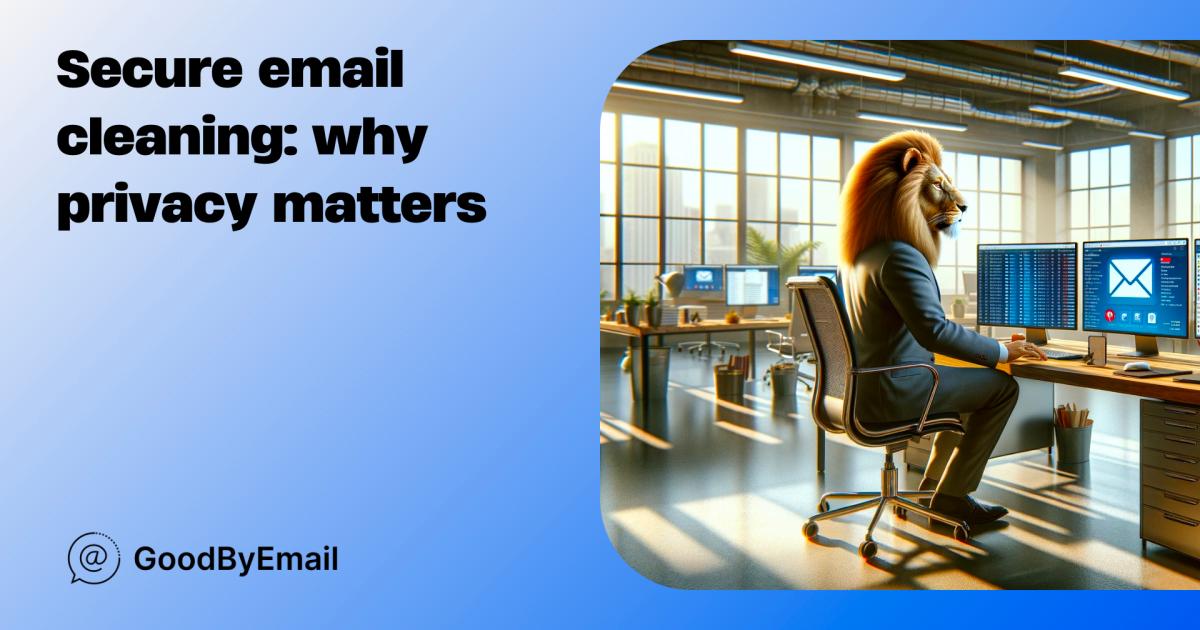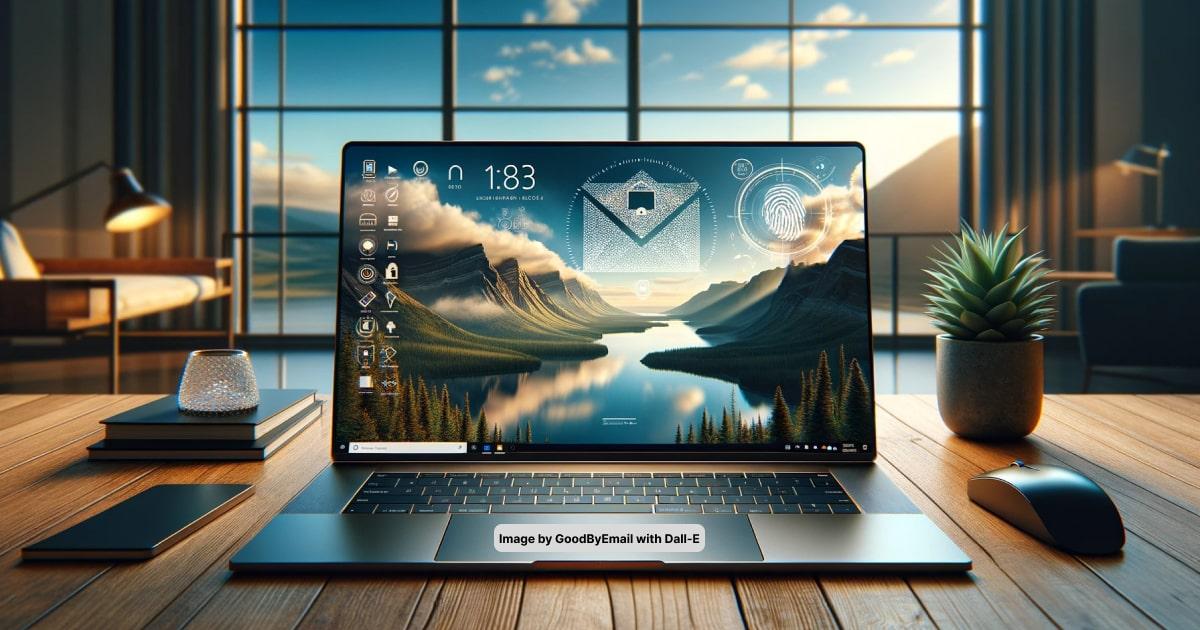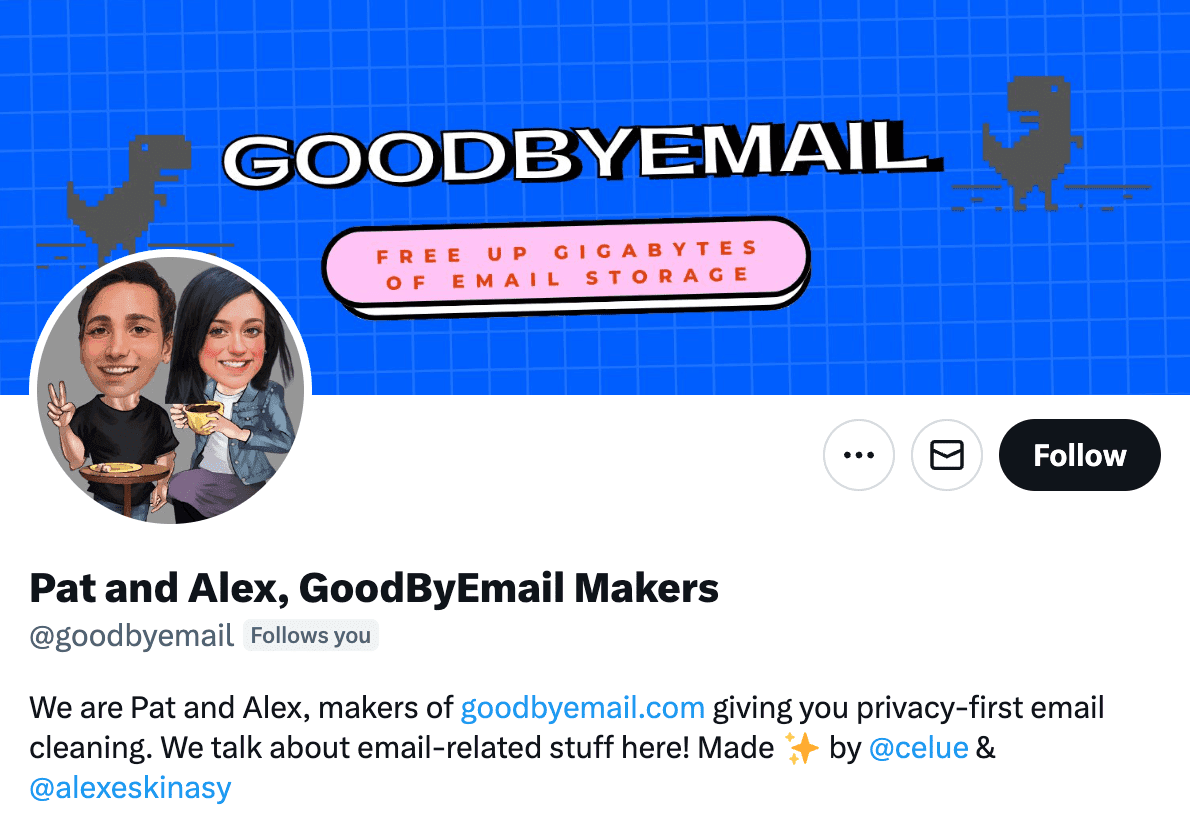Secure Email Cleaning in 2025: Why Privacy Matters
Understand Email Privacy Risks and Safe Cleaning Options

A clean email inbox is a dream come true, but what's the cost? Many email cleaning services promise to make this dream a reality, assuring you that they only need to see your email headers (subject lines and To/From/CC: fields)-and not actual email content/body- to do their job. But is this really the case?
GoodByEmail
Clean up your email, privacy-first
The catch is that these services often require you to grant them full access to your email inbox, not just the headers and subjects. So, while you may end up with a cleaner inbox, you'll also be giving up your privacy.
Do you trust these services to keep their promises? Or would you rather rely on privacy-first solutions that, by design, can't access your emails, even if they tried?
The appeal of a clean inbox is undeniable, but at what cost?
What's the Deal with Email Cleaning Services.
Ever thought about why some email services are free or super cheap? The truth is, they aren't really free. You're not paying with money; you're paying with your data. These companies dig deep into your emails, creating a digital profile of you. So, while your inbox looks neat, you're actually setting the stage for annoying ads, potential identity theft, and phishing attacks.
The Catchy Claims They Make
You've seen the promises:
- "Top-notch security measures": Sounds impressive, but what does it really mean? Are they talking about a padlock or a high-end vault?
- "We value your privacy": Nice words, but actions speak louder. Many of these services have been caught with their hands in the cookie jar, accessing more data than they should. Some have even become news stories!
The Hidden Risks of These Claims
- Encryption claims: Remember these companies will be processing your emails using YOUR credentials (app-specific password, IMAP user/pw or OAuth tokens) and hence will have access to your data. And in most cases, they must store this data on their databases so they can provide you with unsubscription, read-later/rollups or email cleaning services. A lot of companies love to throw around the word "encryption", often referring to encrypting your email data in their database and your credentiuals. But here's the catch: they hold the encryption keys themselves, not you. It's like giving someone a locked diary but leaving the key under the mat. All it takes is one sneaky employee, and your private emails are out in the open.
- Temporary access: Some say they'll only peek into your emails temporarily. But even a quick look can be dangerous. What if there's a leak during that short window? Or what if they decide to keep some data "for improvements"?
OAuth and Permissions: Not as Safe as You Think
OAuth might sound fancy, but it's just a type of access. And just like giving someone a spare key to your house, it can be misused. Some services take this access and run wild with it, peeking into places they shouldn't.
For instance, in order for them to clean gmail, you must grant them gmail.modify permissions, which means they can have full permissions to read ALL your inbox contents, and also to write to it. You can read more about these permissions here.

The Real Price of Data Collection
Data is gold in the digital world. And these services are mining it:
- Over-collection: Some services are like digital hoarders, collecting more than they need. And this pile of data is a hacker's paradise. The more they have, the bigger the target on their back.
- Email access: This one's a biggie. By accessing your emails, they can see personal info, business secrets, and more. All it takes is one slip-up, and that sensitive info could be leaked or sold.
Privacy-First: The Real Deal
True privacy-first solutions don't just talk the talk; they walk the walk. Most of them are designed to collect no data at all. GoodByEmail is a good example: by design, it cannot connect to your email provider, so it does not require any intrusive permissions or OAuth tokens, and it can even process your email inbox offline.
For more on reclaiming your email privacy, check out GoodByEmail's manifesto.
Trusted Voices on Email Privacy
Want to learn more? Check out trusted sources like PrivacyTools and Electronic Frontier Foundation (EFF) for the inside scoop on email privacy.
Questions to Ask Before Signing Up to an Email Cleaning Service
Before you jump on the email cleaning bandwagon, take a moment to ask:
Am I ok with any of my data being collected?
How can I be sure the privacy claims these companies are making are true?
What if they outsource part of their operations to people who need access to the data, and how do you ensure that they follow the same security claims?
In cases where they contract third parties to deliver the product, they say they will transfer and share your data which is necessary to provide or improve features, or where necessary to comply with applicable law. Are you ok with this?
What if they sell the company and transfer my data to a new entity? Can the new entity be trusted?
Am I ok with having to trust companies and their employees to have their heart in the right place?
What are they collecting and why?
How are they protecting my data?
Have they had security issues in the past?
Have you checked their reviews on various places such as TrustPilot?
FAQs: Your Burning Questions Answered
Are "top-notch security measures" enough to protect my emails?
Are "top-notch security measures" enough to protect my emails?
If they say "temporary access," am I safe?
If they say "temporary access," am I safe?
Some tools claim they “operate on my device, hence they are safe”.
Some tools claim they “operate on my device, hence they are safe”.
Are there alternative solutions that never get access to my data?
Are there alternative solutions that never get access to my data?
Do you have a guide on how to clean emails safely?
Do you have a guide on how to clean emails safely?
How about a secure way to perform a thorough gmail cleanup using a privacy-first approach?
How about a secure way to perform a thorough gmail cleanup using a privacy-first approach?
How can I safely archive, backup, or export my email inbox without granting third-party access to my data?
How can I safely archive, backup, or export my email inbox without granting third-party access to my data?
Remember, a clean inbox is nice, but your privacy is priceless. Make sure you're not trading one for the other 🛡️
Clean up your email inbox with way less effort. Check out GoodByEmail and discover why your inbox is out of storage. With GoodByEmail's help you can mass delete emails from unwanted top offenders and unsubscribe from undesired mailing lists with a single click. It's the only truly secure option on the market, your emails never leave your device.
Quick plug: Clean up your email, privacy-first 💪
Isn’t it frustrating to constantly receive that "Your storage is 95% full" message?
Scared of using Email Cleaning, Unsubscribe or Declutter tools that snoop around your emails, even though they swear they are safe?
We got your back! If you haven’t tried GoodByEmail, it’s about time. Not only does it identify which email senders—many of whom you likely don’t care about anymore—are consuming all your storage space, but it also allows you to effortlessly unsubscribe from mailing lists with complete safety!
GoodByEmail uses a unique privacy-first approach by design: It simply cannot connect directly to your email provider. It does not require you to share any logins, credentials, oauth tokens, nor any sort of invasive permissions whatsoever. All the processing happens on your computer and no emails are ever uploaded to GoodByEmail's servers. Plus, you can even use it offline for maximum privacy!
Could you really trust other cleaning solutions available in the market, knowing they have direct access to your emails? Some services monetize by selling your data. Even if they claim it's secure, it raises concerns about the accessibility and potential misuse of your personal information.
GoodByEmail works with every email provider, you name it: Google, Microsoft, Fastmail, AOL, Yahoo Mail, iCloud, Office 365, Outlook, Zoho, Bluehost Mail, Namecheap Mail, Alibaba Mail, Alimail, Alyun, Gmail, Mail.com, Comcast Xfinity, Live, Hotmail, Yandex Mail, G Suite, MSN, Godaddy Mail, GoogleMail, and so many more.
You only need to make a one-time secure export of your inbox in mbox or .pst format, and GoodByEmail will find out who are the senders eating up your inbox storage space, without anyone else getting a look at your emails. Plus, you can also easily unsubscribe from those pesky subscription emails. It’s easy to do! Need help? This guide has a step-by-step.
Wondering where to find us?
Follow us on X:
